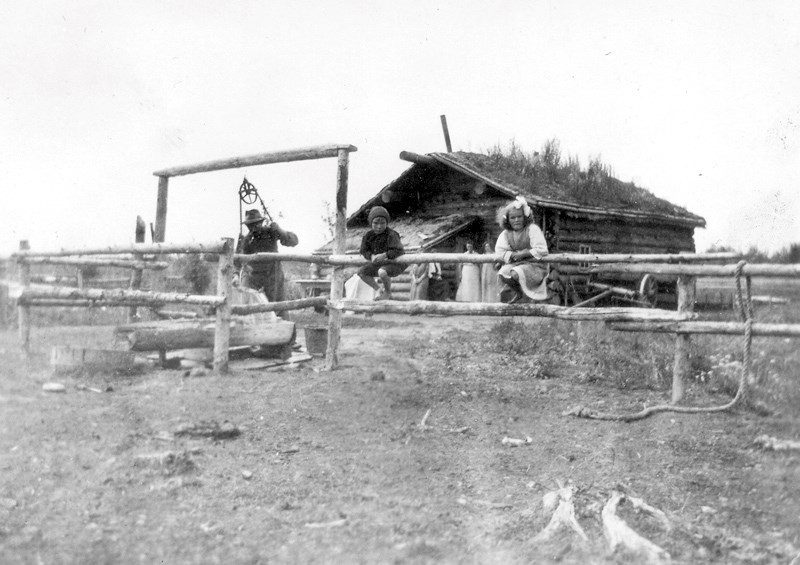They will be partying Neerlandia-style this week. There will be Bible readings and songs along with fireworks and helicopter rides. There will also be the opening of a new cemetery gate and activities marking a proud farming tradition.
When the centennial ceremonies begin on Thursday evening, David Terpsma’s heart will be overflowing with emotion.
Not only will it mark the culmination of months of planning for the biggest celebration in Neerlandia’s history. It will also have a deeply personal meaning – his grandfather Douwe Jan Terpsma, wife Brechtje (nee Dykstra) and seven children were one of the handful of families who came from Holland in 1911 to found the tiny hamlet.
The pioneers’ story of unbelievable hardship and triumph will colour the Aug. 2-4 occasion, creating a mood of celebration, thankfulness and deep reflection.
“Yes, there will be a lot emotion,” says Terpsma, president of The Neerlandia Historical Society, which has organized an event expected to attract thousands, including a host of local dignitaries.
Last week Terpsma reflected on his family’s story and his paternal grandfather’s historic journey from Friesland, Holland. Several times he referred to the historical society’s 1985 book A Furrow Laid Bare, which records the hamlet’s history.
One can only speculate about the feelings of Douwe and his family as they boarded the boat for Canada: excitement probably, hope, and trepidation.
In Holland, Douwe had worked mainly on dairy farms. In Canada, there was the prospect of being given a quarter of land by the government and making it the foundation of a new life. But would the soil be fertile? Where would they live? What about schools? There were so many unanswered questions.
After landing in Halifax the family travelled for four days by train to Strathcona, Edmonton, where they assembled in an immigration hall. A settler and fieldman called Henry Kippers helped them find temporary lodging at a shack near High Level Bridge, Edmonton.
A Furrow Laid Bare contains a picture of Douwe and Brechtje with one of their three daughters outside the shack. It would have been taken shortly before they embarked on a 16-day trip by oxen and cart to Neerlandia, taking with them whatever belongings they had.
David Terpsma’s father, Norman, was just two at the time of this epic journey.
“When the family arrived there was nothing but water, bush and coyotes,” says David. “It was a matter of them having to clear the land and get ready for ploughing.
“What they wanted was fertile land for crops, hay and cattle, and that is how it turned out to be.”
As it was fall, the temperatures were already dropping and shelter was critical.
“They built themselves a log cabin,” says David. “I don’t think they realized how cold it would be. It was very rough in the bush.
“You have to remember this was a time when there was no power. The only lights came from gas lamps.”
The settlers also built a log church which doubled up as a school.
“Christianity was huge,” says David. “It was the way of life for the families. Faith was number one. There was a feeling that ‘God is our strength and song. God will provide.’ The settlers’ priorities were church, home and school.”
It is hard to imagine how Neerlandia’s founders could have survived without faith. Their resolve was tested to the limit by their new surroundings.
“Grandma Brechtje wanted to return to Holland,” says David. “She felt very woebegone, but there was no money to go back.
“I think it was awful for the women back them. Very hard for them indeed.”
An added complication was that the pioneers did not speak English, having to pick it up as best they could. Education was primitive by today’s standards.
“My dad had to walk to school,” says David. “At that time children had to make do with unlicensed teachers. Nevertheless dad learned English and as an adult spoke it very well without an accent.”
On Dec. 18, 1911 16 men filed for their land they were occupying, giving them official entitlement.
Then there was the key question of a name for their new home. A lot of thought went into it; they finally agreed on a hybrid Dutch word.
“Neer means low in Dutch, which seemed appropriate given the dips in the land,” says David. “Landia just refers to the land. Put them together and you have Neerlandia.”
On the other side of David’s family, his maternal grandmother, Hendertje Wierenga (nee Oosterheert) married Lammert Wierenga.
They came to Canada in 1928 and had a daughter, Ilie Wierenga, David’s mother.
Born in 1944 in Barrhead, David is a third generation Neerlandian and has lived in the area all his life apart from a period in Abbotsford, BC.
“Once a prairie boy, always a prairie boy,” he says.
His brother Lawrence and Lucille Terpsma (a family name, meaning small hill) still live at the family’s original property, although the log home has disappeared.
The centennial celebrations are a chance for Neerlandians to take stock, see where they have come from and where they are headed.
What the hamlet has now, says David, is a vibrant community boasting a Co-op, Canadian Reformed Church with more than 500 members, Christian Reformed Church and United Reformed Church. There are also two schools – Neerlandia Public Christian School and Covenant Canadian Reformed School.
Neerlandia is very far from a struggling rural Albertan community.
“We see ourselves as progressive,” he says. “We are phasing in, not phasing out.”



